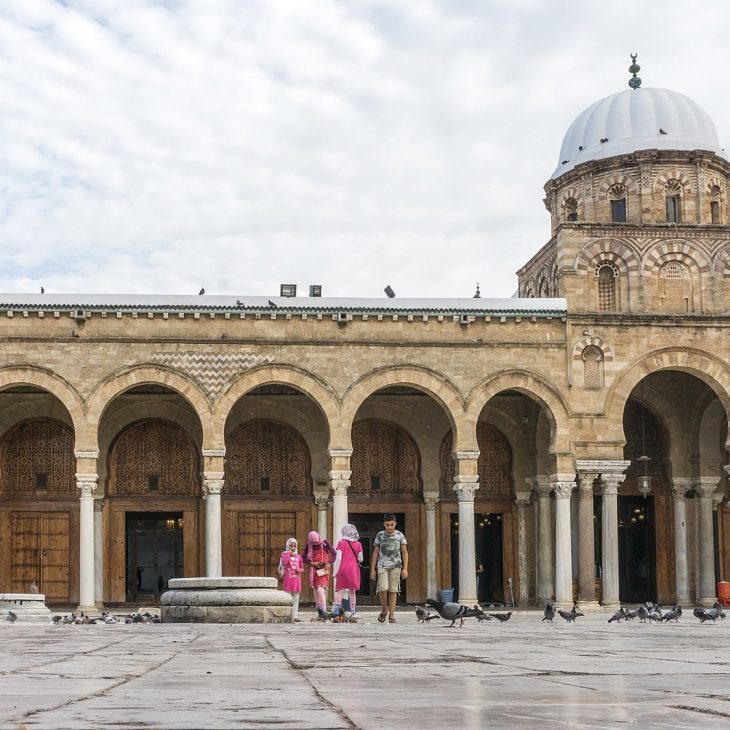Following The Prophet’s Example this Ramadan
April 21, 2020

It is a Friday evening days before the start of Ramadan. I am surrounded by bags containing presents of leather goods, silky scarves and traditional jewelry, fragrant musks and cooking spices. I am one of hundreds of believers gathered in the beating heart of the Tunisian capital; the 1,300 year-old Zaytuna Mosque, situated in a bustling bazaar in the Old City of Tunis. We are segregated by gender as we recite the last chapters of the Holy Quran and chant praises of the Prophet Muhammad. A renowned scholar begins to discuss the blessings the upcoming month and the woman next to me hands me prayer beads. A television crew records this annual event hosted by a colleague, Imam Haythem Limam, a popular national media personality and religious leader; millions are likely watching at home. It is 2019 and the air is buzzing in anticipation of Ramadan.
This year, Muslims around the world will welcome the sacred month in stark contrast to that warm, electric night I experienced in Tunis. Malls and bazaars silent without the throngs of shoppers buying Eid presents; no evening feasts with friends and family, no nights of communal worship – all that’s left are our screens and internet connections. Weeks ago, the global pandemic Covid-19 disrupted the celebrations of our Jewish, Christian, and Sikh siblings; now it’s my community’s turn to redefine what it means to have and hold community during the most sacred month in our liturgical calendar.
“Oh you who believe: fasting is prescribed for you as it has been prescribed for those who have believed before you so that you may be God-conscious” (Q 2:183)
The Quranic injunction to observe the month of Ramadan by abstaining from food and drink from dawn to dusk is a direct link to the other Abrahamic traditions. And indeed, Ramadan is often marked by interfaith iftars and community service done in tandem with local interfaith partners. “Iftar in the Synagogue” – where local Jewish communities host their Muslim neighbors – has long been a Chicago Ramadan staple.
Fasting in Ramadan aims to heighten a believer’s awareness of God and, as such, an individual can certainly spend the entire month in fasting, self-reflection, and prayer without interacting with another soul. However, for most Muslims, Ramadan is a communal affair. Iftar invites are sent months in advance. Sunni communities hold nightly Taraweeh prayers, Shia communities hold nightly religious programming. Muslim non-profit organizations often rely on Ramadan gatherings to fortify their budgets for the entire fiscal year.
Yet, not all Muslims observe Ramadan in bustling mosques or seated with family enjoying a bounteous spread. Many converts, who may live alone or with family members of other faiths, are used to solitary meals. And many Muslims avoid mosques that are not welcoming of women or behave like social clubs catering exclusively to one or two ethnicities.
Recently I noted that Muslim men – temporarily restricted from attending mosque for Friday prayer as a result of physical distancing measures – will finally understand how it feels to be denied access to sacred space. The tweet was a commentary on how restricting access to the mosque affects Muslim women’s communal religious experiences; a challenge I have worked to address. However, it anticipated the challenges that will no doubt accompany the use of technology as a means of sustaining community bonds during the sacred month of Ramadan.
A preacher can upload her sermon, a chef can livestream his favorite holiday recipes, vocalists can record live sessions of their Quran recitations. Non-profits can raise funds, artists can sell their crafts, and shoppers can buy Eid presents all online. The internet and social media can go far in creating spaces for community. But they can only go so far. Ramadan cannot truly be Zoomed.
I pray we will not allow technology to dominate our Ramadan. Solitary self-reflection has always been integral to the month. Muslims believe that the Quran was first revealed to the Prophet Muhammad during Ramadan while he was on a mountain retreat in Cave Hira, disconnected from friends and family. We can follow his prophetic example and carve time out for private worship and self-reflection. We can still share meals with neighbors (while maintaining social distance), donate, and volunteer. Ramadan 2020 will be like no other, but I still hope to see Blackout Eid trend on Twitter!
Share
Related Articles
American Civic Life
American Civic Life
Is This a Time for Bridgebuilding? 5 Leaders in Conversation
American Civic Life
The Interfaith Legacy of Muhammad Ali: “The Wise Man Changes”



